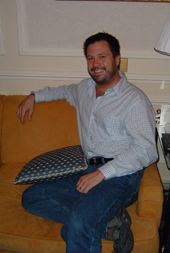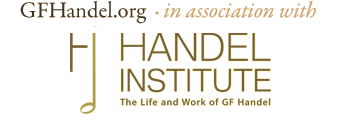Issue 10: August 2003Interview with countertenor David Daniels Introduction: David Daniels (DD) spent two weeks in Paris in July to record Les Nuits d’été by Berlioz and other mélodies with orchestra1 . On the 17th July 2003, after the recording sessions finished, he spoke with Philippe Gelinaud (PG) at the Intercontinental Hotel in Paris. PG: What is your earliest memory of Handel's music? DD: Being American, it is of course Messiah! Messiah for Christmas, Messiah for Easter, Messiah everywhere and all the time! PG: You started out as tenor. Did you already sing a lot of Handel arias? DD: No, I sang none - or almost none. Well, in fact, I sang some pieces from Messiah (“Every valley”, etc.) and an aria from Samson, “Total eclipse”, and that’s all. PG: After you changed to singing countertenor, what was your first experience with Handel’s music? DD: The first Handel arias I sang as a countertenor were probably the alto arias out of Messiah! Then I sang Britten’s A Midsummer Night’s Dream in 1992, Richard Strauss’s Die Fraue ohne Schatten in 1993, with Gwyneth Jones, and I sang Nerone in Monteverdi’s L’Incoronazzione di Poppea in 1994. My first Handel opera role was Arsamene in Serse in 1995. PG: Has your perception of Handel’s music change since then? DD: Sure, of course. I knew him as the composer who wrote Messiah and some operas, but at that time I just did not know Handel intimately, I did not know what a genius he was as a composer. The more you sing it, the more you perform it and learn new repertoire of him, the more impressed you are with the power of his music, the amazing way he put music into the drama. PG: Let’s talk about your first Handel recital recording2. Did Virgin want a Handel recital, or did you immediately choose to record a Handel programme? What was working with Sir Roger Norrington like? DD: I chose the project and the programme, and Virgin agreed. I like Norrington: I have done Bach’s Mass in B minor with him since, and I will perform an arias concert with him in Carnegie Hall. It was my first recording, and I didn’t know how to do a recording, what did it mean to be in a recording studio. I was very nervous. Thus he was very much in charge. I was afraid to give my ideas concerning tempi, interpretation or anything, so I just did what he said to do. Now it obviously would be more of a collaboration, but at that time I was scared to death. PG: Did you have models among elder singers whom you looked to for interpreting Handel’s music? DD: Not until I begin to sing myself. When I started to work as a countertenor, to work in operas, that’s when I learned a lot from the singers I was working with and I listened very closely to them. And certainly the biggest influence was Lorraine Hunt, by far. More than anything, I learned a sense of naturalness and honesty with performing. I learn to strive to leave the histrionics, opera pauses and that sort of things, to really go into the text, into the drama, into the emotion of the character: to be as honest as if I was walking down the street singing. I have learned that from her. Everyone is different, but she has such a physical presence, she was really a huge influence on me, and I was fortunate to do many things with her at the beginning of my career. PG: Who are the singers you would pay to go and hear now? DD: I go hear a lot of things. I was just in Munich to sing in Saul and I went to hear Rodelinda with Michael Chance and Dorothea Röschmann. And when I sing in a festival, I go to many different things, not just baroque, but there is no specific singers I would particularly pay to hear, they are too numerous! PG: Can you tell us about what it was like to work with Cecilia Bartoli on Rinaldo? DD: That situation with Rinaldo was particular. I wish I could do it again because of many reasons. First, I know Cecilia now: not only do I respect her as an artist, as a singer, as an interpreter, but I like her, she is a lot of fun and I feel more comfortable speaking with her. When I entered this project I had never sung Rinaldo before, so I was singing Rinaldo for the first time and I was singing with Cecilia Bartoli for the first time. In fact, I was meeting her for the first time. I was really, really nervous and uptight, because she has such a big huge name and persona. Second, I wish I had recorded and performed that recording after doing it on stage. I mean I did it in concert version but it’s not the same as doing a staged version with six weeks of rehearsal. You really get into the opera, you know intimately the other characters’ arias. That’s the best way to make a recording, but it doesn’t always happen like that because of time and money, or lack of money… PG: What do you think are Handel's greatest assets as a composer? DD: There are many things actually, but I think the one which impresses me the most is something which is pretty much in all of his operas, or at least the ones I have performed: he has a way of beginning an opera, and as the momentum of the drama picks up, the momentum of the music picks up. The first act is a sort of very nice introduction, and by the middle of the second act, the characters are really evolving and the drama has a greater acceleration and the arias fit that energy. Each aria becomes more a masterpiece after another masterpiece, after another masterpiece… And almost of his operas have that. That’s what I respect the most and I just find it incredible. For example, I didn’t know Rodelinda that well, and the other night when I saw it in Munich I didn’t really know which arias were next, and sitting there listening to the second act was just incredible. Even Unulfo’s arias are unbelievable arias, and I didn’t know that. I just couldn’t believe it. PG: What do you think of Handelian vocalità? Is it very different compared to singing Bach? DD: I think he is really a vocal composer. Unlike Bach’s, Handel’s music is incredibly vocal. Everything makes sense vocally when you sing it, the direction of the phrases, etc., I could sing it for you but it’s hard to explain! And I find, especially in his largo arias, the way he writes them, he really allows you to sing the legato line. He is definitely a bel canto composer. I don’t mean it’s the beginning of bel canto, but I consider it bel canto. I love Bach and I’m going to sing more Bach, but it is much more instrumental. I am not saying anything new, every singer who has sung Bach is saying the same thing. There are very long phrases. For me, singing something like the St Matthew Passion is just as amazing as singing in a Handel opera, although I’d rather sing some of the bass’s arias - I like the bass arias better! PG: And what about Vivaldi ? DD: I don’t know his operas that well. I will record Bajazet with Biondi this year, thus I’m just learning Vivaldi at the moment, and I don’t really know yet what to say about that. PG: Which Handel roles have you already sung on stage or in concert would you particularly like to record? DD: Well, although I think there are roles that probably fit my voice better than this particular role, I obviously want to record Cesare from Giulio Cesare in Egitto. I sing it so much, it would be ridiculous to go through my career and not record it. That would be really stupid. And I would love to do a recording of Partenope: Arsace is my favourite role that I’ve sung so far. I’m just now starting to look at Orlando, which looks really interesting: I’ll do my first production of that in 2006 in Munich. And I’m learning Bertarido for next year. But certainly Cesare is the one I’d love to put down on disc at the moment. PG: So why do you think this role isn’t the one that fits your voice best? DD: I’m not apologizing for what I do with Cesare, I think I sing it well, that’s not what I meant. One, I don’t think the character of Cesare is overly interesting. Of all the characters in that opera, I think Cesare and Cleopatra are the least interesting, as personalities that begin here and end here, even if Cleopatra is more interesting. Cesare is the same when he enters as he is at the end. And one of the things which makes me think that a role like Arsace fits my voice better is that the tessitura is slightly higher. Cesare is a low tessitura, especially at baroque pitch. Although I prefer it played on period instruments, I prefer to sing the role at 440 pitch. Also, Cesare is so serious. Arsace has the seriousness and the heartbreaking qualities, but he is also fun, playful. I don’t see that in Cesare. PG: Whatever the music you sing, you always seem to be particularly careful with the text. How do you proceed with the literary and the musical texts when you work on a new part? DD: Well, I just have Italian coaches for the text. There is a wonderful woman in London, and the lady here in Paris is fantastic, she is incredible. With the secco recitative you really just have to approach it as a spoken language. I just coach, study and try to improve and I will constantly continue that. PG: What are your future Handelian or baroque music projects, on stage or in studio? DD: I have no Handel recording projects. It is very difficult these days: people are just not recording complete operas as before. Classical recordings are in trouble, but I am one of the very fortunate singers that is with a label that is willing to do solo CD’s. As much as I’d like to record complete operas with Virgin, I can’t get too angry because I’m really lucky that I keep recording solo discs. There are many singers that would like to switch place with me. On stage, Bertarido is the next new role, and then I’ll sing in Mozart’s Mitridate at Covent Garden, and, as I said before, Orlando in 2006 in Munich. PG: Can we have any hope that you will do a second Handel opera arias recital? DD: I’m singing for a few minutes on Emmanuelle Haïm’s recording of Dido and Aeneas and I’m doing a Bach CD next with her, but we are still talking about that. Then I’m going to record Pergolesi’s Stabat Mater with Patrizia Ciofi, and possibly another Vivaldi disc of sacred music. There is an opera project with Emmanuelle too. So there are a lot of things which are to come up before I do another Handel CD, but surely I’d like to do another one, maybe with more rare arias.
1 Under John
Nelson and with his Ensemble Orchestral de Paris – to be released on Virgin. Unless explicitly specified otherwise, this page and all other pages at this site are Copyright © 2015 by David Vickers and Matthew Gardner Last updated: August 30, 2020 · Site design: Duncan Fielden, Matthew Gardner and David Vickers |

